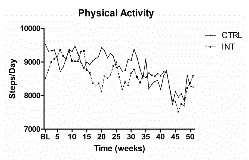Enhancing Quality of Life Through Physical Activity in Children with Epilepsy: A Randomized Controlled Trial With a Behavioural Counselling Intervention
Abstract number :
2.295
Submission category :
8. Non-AED/Non-Surgical Treatments (Hormonal, alternative, etc.)
Year :
2018
Submission ID :
500110
Source :
www.aesnet.org
Presentation date :
12/2/2018 4:04:48 PM
Published date :
Nov 5, 2018, 18:00 PM
Authors :
Gabriel M. Ronen, McMaster University; Denver Brown, McMaster University; Daniella Pohl, University of Ottawa; Steve Bray, McMaster University; David Streiner, McMaster University; Mark A. Ferro, University of Waterloo; Nadilein Mahlberg, McMaster Univers
Rationale: Despite encouraging evidence showing that physical activity improves multiple health outcomes and quality of life among adults with epilepsy, research has not yet been extended to children with epilepsy. Literature indicates that behavioural counselling, in combination with activity monitoring, may be essential ingredients of interventions to promote adoption and maintenance of physical activity among children with epilepsy. The purpose of this study was to examine whether increasing physical activity through a 6-month program, including behavioural counselling and self-monitoring of activity, as compared to current practices, positively influences quality of life over 12 months among children and youth (ages 8 to 14) with epilepsy. Methods: A longitudinal, multi-site, randomized controlled trial was conducted. Participants wore a pedometer to track daily physical activity and completed measures to examine quality of life at four time points: baseline, 16, 28, and 52 weeks. Stratified by site, participants were randomized to an intervention or control group. The 6-month intervention included 11 behavioral counselling sessions targeting motivational and self-regulatory factors of physical activity. Analysis involved mixed-effects linear growth curves. Results: We recruited 122 of 242 eligible children with active epilepsy of whom 115 were randomized. Results demonstrate the intervention failed to improve physical activity compared to controls over time during the 6 month intervention period (p > .05). No differences were witnessed between groups over time during the subsequent 6 month follow-up period (p > .05), however, physical activity appeared to decrease among all participants physical activity (p < .05). Results failed to show differences between the groups and over time for measures of quality of life (all ps > .2). Conclusions: Compared to controls, the intervention was unsuccessful at improving and sustaining physical activity levels over a 12 month period among children with epilepsy. Despite both groups demonstrating declines in physical activity over one year, we failed to show any changes in self-reported quality of life. We realized that most of the recruited youth started the study with an already high step count of ~9000 steps/day that was difficult to surpass over a longer period. It seems that sedentary youth declined to participate in this study, suggesting poor self-management in this specific group of children. Funding: Ontario Brain Institute (OBI) EpLink section, the Innovation Fund of the Alternative Funding Plan for the Academic Health Sciences Centres of Ontario (HAHSO), and the Ottawa Hospital Academic Medical Organization (TOHAMO) Innovation funds.
